09 Oct 2013 - {{hitsCtrl.values.hits}}
.jpg) The Intergovernmental Panel on Climate Change (IPCC) was established in 1988 by the World Meteorological Organization (WMO) and the UN Environment Programme (UNEP) for the purpose of assessing scientific , technical and socio- economic information relevant to understanding the risks associated with human – induced climate change, its potential impacts, and options for adaptation and mitigation.
The Intergovernmental Panel on Climate Change (IPCC) was established in 1988 by the World Meteorological Organization (WMO) and the UN Environment Programme (UNEP) for the purpose of assessing scientific , technical and socio- economic information relevant to understanding the risks associated with human – induced climate change, its potential impacts, and options for adaptation and mitigation.
26 Nov 2024 6 minute ago
25 Nov 2024 25 Nov 2024
25 Nov 2024 25 Nov 2024
25 Nov 2024 25 Nov 2024
25 Nov 2024 25 Nov 2024